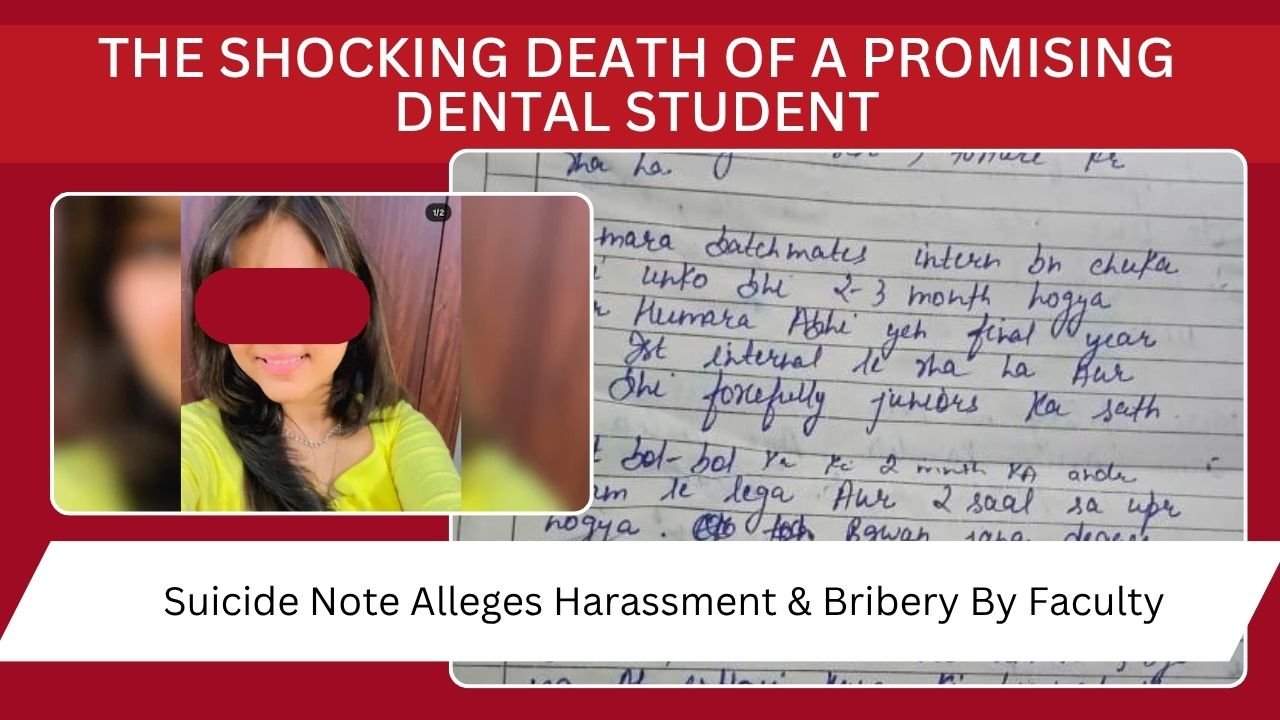The untimely death of Shweta Singh, a bright Bachelor of Dental Surgery (BDS) student from Jammu & Kashmir, has sparked outrage and drawn national attention to academic harassment and student mental health issues. Shweta, originally from Doda and residing in Sarika Vihar, Bantalab, Jammu, was studying at Pacific Dental College and Research Centre in Udaipur, Rajasthan, when she allegedly died by suicide due to persistent academic harassment. A suicide note recovered from the scene has named two faculty members, accusing them of causing immense mental trauma.
Allegations of Academic Harassment at Pacific Dental College
A suicide note recovered from the scene reportedly named two faculty members who were allegedly responsible for subjecting her to extreme psychological distress. According to the All India Medical Students Association (AIMSA), Shweta faced systematic academic discrimination. Despite being a 2020 batch student, she was placed in an “odd batch” without valid justification, and her third-year examinations were delayed by over a year—a move that shattered her academic timeline while her peers progressed toward graduation.
This girl was from our Doda assembly. Harassed at Dental college in Rajasthan. Forced student take her life. Mafia is everywhere in every city and department. Note before death
— Mehraj Malik (@MehrajMalikAAP) July 26, 2025
Actions must be taken.@narendramodi @AmitShah @manojsinha_ @OmarAbdullah pic.twitter.com/aWzYgmfWcI
This academic bias, as stated by AIMSA in a letter to Rajasthan Chief Minister Bhajan Lal Sharma, severely impacted Shweta’s mental health, ultimately pushing her toward a fatal decision.
Shweta Singh: A Symbol of Determination and Big Dreams
Shweta was a brilliant and determined student, always aiming high. Her school board marks were consistently above 90 percent, and she had already qualified for BSc Nursing before earning a scholarship for BDS, which she accepted with hopes of becoming a doctor. Her family recalls how she often said, “I will become a doctor and fulfill all your dreams. I will take you around the world.”
She was the eldest among her siblings—sister Suhani, currently a lab assistant trainee at GMC Jammu, and young brother Naksh, a school student. Her tragic loss has left the entire family devastated, especially her younger siblings who now cry, whispering, “Didi, come back… we will never fight again.”
Social Media Activity Hints at Hidden Pain
While her smiling pictures on Instagram painted a joyful image, they now tell a different story. Some of her reels were deleted, and family members reveal she was planning to buy a new mobile phone after returning from college. These small signs, often overlooked, point toward silent suffering—a common thread in many student suicides across the country.
Mental Health Experts Speak Out
According to Dr. Manjeet Singh, Professor and Head at Acharya Shri Chandrashekhar College of Medical Sciences, Sidhra, it is critical for parents, teachers, and institutions to understand that a smiling face on social media doesn’t always mean happiness.
“Especially with students, we must be alert. The silence or withdrawal of a child must never be ignored,” Dr. Singh warns.
He emphasized that parents should initiate communication proactively. Whether a child is studying in Udaipur, Gurugram, or elsewhere, incidents like this underline the importance of mental health awareness and emotional support.
The Need for Stronger Parent-Child Communication
Shweta’s death raises an essential question: Are we doing enough to listen to our children? Parents must look for early warning signs, such as:
- Isolation or lack of enthusiasm
- Deleting social media content
- Declining performance or interest in academics
- Avoidance of conversations or eye contact
Dr. Singh insists, “Children often wrongly believe that all doors are closed. We must show them that’s not true. Life is tough, but suicide is never the solution. We need to teach resilience, not perfection.”
A Call for Reform in Academic Institutions
This heartbreaking incident has opened up a broader conversation about toxic academic environments, especially in professional colleges where pressure to perform is immense. Institutions must:
- Establish anti-harassment cells
- Ensure transparent academic policies
- Provide counseling support to students
- Act swiftly on student grievances
The negligence and alleged harassment at Pacific Dental College cannot be brushed under the rug. Authorities must hold those responsible accountable and implement preventive systems to ensure no student has to endure what Shweta went through.
Shweta Singh’s Death Must Not Be in Vain
Shweta Singh was more than a victim—she was a dreamer, a beloved daughter, and a role model for her siblings. Her story serves as a painful reminder of the urgent need to address academic bullying, improve mental health support, and foster open communication within families and institutions.
As her family mourns an irreplaceable loss, India must introspect. How many more students must suffer before we act?
Let Shweta’s voice echo through the reforms we bring. Let her story inspire awareness, action, and change.
















